Menopause, a natural part of aging that every woman experiences, often comes with its own set of unique challenges. Among these, hot flashes — a sudden feeling of warmth spreading through the upper body and face — have become an almost synonymous symptom of this transformative phase.
While hot flashes might be commonly associated with menopause, many women actually start experiencing them during perimenopause, the preparatory stage before menopause. According to the National Institute on Aging, about two-thirds of women experience hot flashes in perimenopause and menopause, with some even continuing to have them into their postmenopausal years.
Hot flashes can be mild or severe, with symptoms varying greatly from person to person. One might feel slight warmth, while others might break into a sweat or experience a rapid heartbeat. The frequency and intensity of these hot flashes can significantly impact a woman’s quality of life.
So, what causes these hot flashes, and what happens in the body when one occurs? How long do menopause hot flashes last, and what are the best natural remedies for hot flashes in menopause?
We’ll answer these questions and more, offering insights grounded in Ayurvedic practices and contemporary research. As we journey together through the fascinating intricacies of hot flashes and menopause, you’ll be empowered with practical strategies to manage and potentially alleviate these symptoms. Let’s uncover the mysteries of hot flashes and menopause together, so you can feel more equipped and confident through this significant phase of life.

Understanding Hot Flashes in Menopause
Hot flashes during menopause are characterized by a sudden, intense feeling of warmth spreading over the body, particularly around the face and upper body. This is often accompanied by a red, flushed appearance and can trigger heavy sweating and palpitations. This discomforting symptom, while largely associated with menopause, often begins in the perimenopause stage and can persist even after menopause, in the postmenopausal years.
A hot flash can occur at any time, whether you are eating food, in the middle of a meeting, attending to important tasks, or under emotional turmoil. And when it happens, it muddles up and interferes with the task that needs your immediate attention.
How Long do Hot Flashes Last?
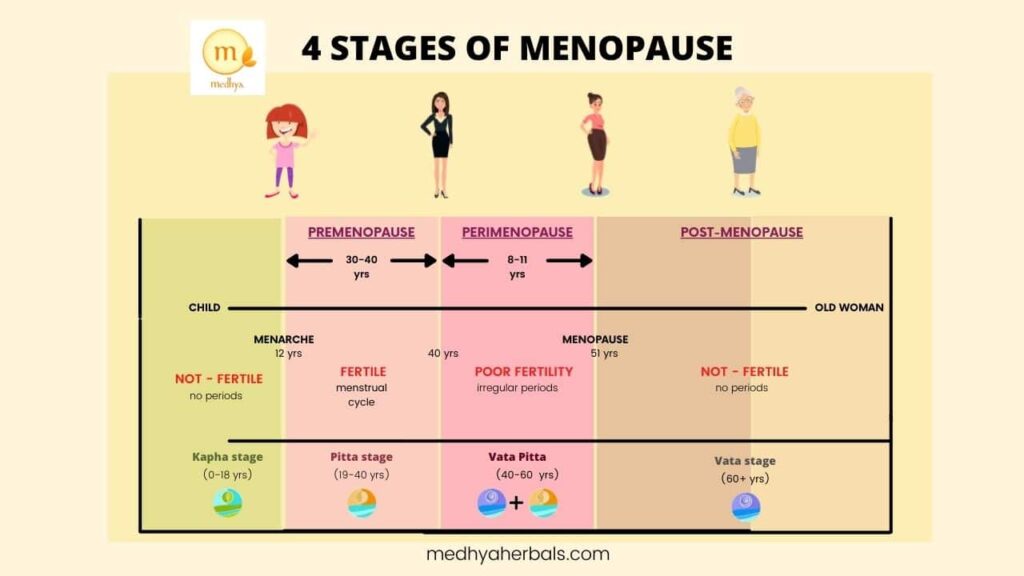
Hot flashes typically last anywhere from a few seconds to several minutes, though some can go on for up to 10 minutes. Some women may experience hot flashes a few times a week, while others may have them several times a day.
Usually, hot flashes start to increase in frequency and intensity during later years of perimenopause. This can disrupt the daily life of women during Menopause, affecting their energy levels, quality of sleep, and sexuality in the long term.
The frequency and duration can vary greatly depending on individual factors like genetics, body weight, and lifestyle. However, on average, most women experience hot flashes for about seven years, and for some, they can persist for a decade or more post-menopause.
How Do Hot Flashes Feel?
The sensation of a hot flash can vary from woman to woman. For some, it feels like a sudden wave of warmth surging through the body, sometimes causing the skin to sweat profusely and turn red. For others, it’s a milder, less noticeable warmth. Some women may also experience a rapid heartbeat or palpitations, a sense of anxiety, or a feeling of being suddenly chilled after the hot flash.
First Signs of Hot Flashes in Menopause
The first signs of hot flashes in menopause can vary among individuals, but they often include:
- A sudden feeling of warmth: This usually begins in the upper body, particularly in the chest or neck region, and can spread throughout the body. This warmth can range from mild to intense.
- Skin flushing: Along with the feeling of warmth, your skin, particularly on your face and neck, might turn red. This is due to the dilation of blood vessels near the skin’s surface in response to the increase in body temperature.
- Sweating: Hot flashes often trigger perspiration. Depending on the severity of the hot flash, the sweating could range from mild to severe, with some women experiencing night sweats that can soak their nightclothes or bedding.
- Heart palpitations: Some women may experience a rapid or irregular heartbeat during a hot flash.
- Chills: After a hot flash, as the sweat evaporates from your skin, you might feel chilled or get goosebumps.
- Anxiety or a feeling of unease: Some women might experience a sense of anxiety or discomfort associated with the sudden change in body temperature.
It’s essential to note that the intensity and frequency of hot flashes can vary greatly among women. Some may only experience mild, infrequent hot flashes, while others may have several intense episodes a day. Recognizing the initial signs can help you better manage hot flashes as you navigate through menopause.
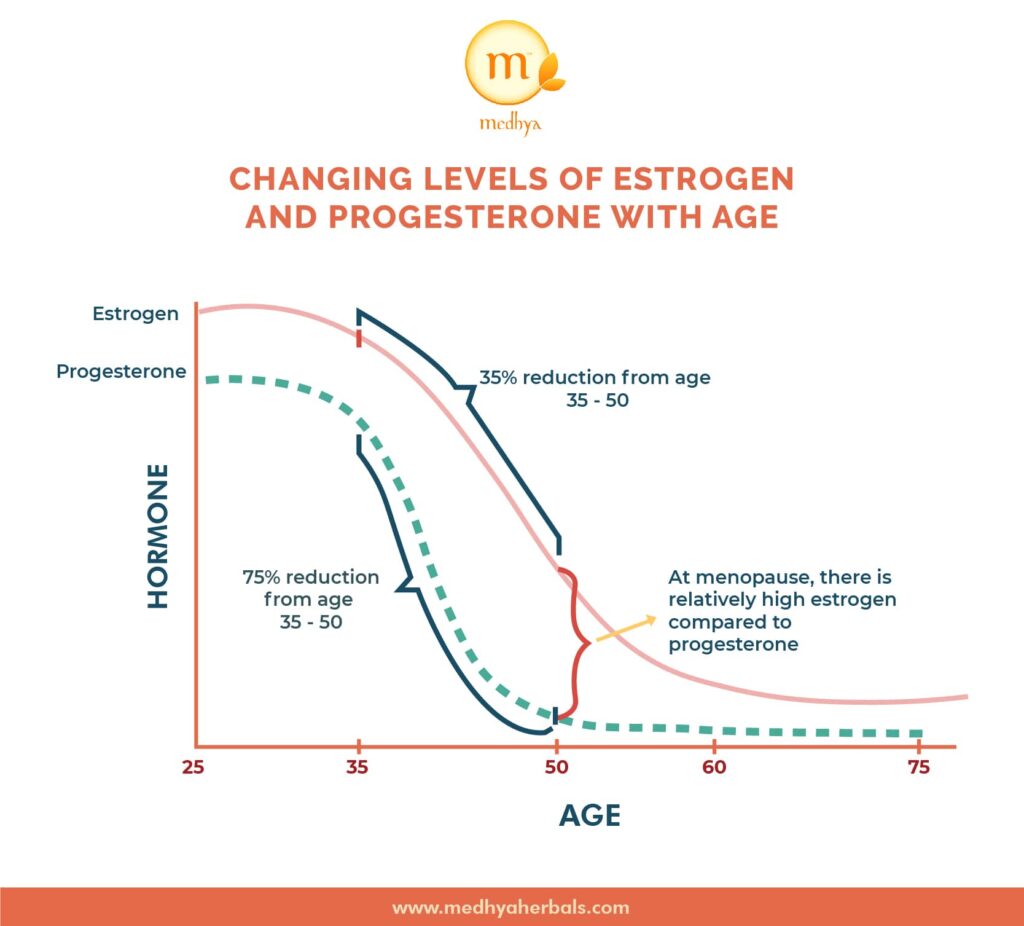
What Causes Hot Flashes in Menopause?
Hot flashes during menopause are primarily caused by the natural changes in hormone levels in a woman’s body, particularly the decline of estrogen, the hormone that regulates the female reproductive cycle.
Estrogen has a direct effect on the hypothalamus, the part of the brain responsible for controlling appetite, sleep cycles, sex hormones, and body temperature. When estrogen levels drop, the hypothalamus may mistakenly sense that the body is overheating. In response, it releases chemicals that cause the skin’s blood vessels to expand to dissipate the perceived heat, leading to a hot flash.
While declining estrogen levels are the main causes, it’s also essential to note that not all women with low estrogen experience hot flashes, suggesting that other factors also play a role. These may include:
Multiple Triggers of Hot Flashes
Hot Flashes can get triggered from anything that builds up heat suddenly. It can be in the form of spicy food, hot weather or even stress.
- Lifestyle Factors: Certain habits like smoking, consuming a high-fat or high-sugar diet, drinking caffeinated or alcoholic beverages, and leading a sedentary lifestyle may increase the risk of hot flashes.
- Obesity: Women with a higher body mass index (BMI) are more likely to experience hot flashes. This could be due to the insulating properties of excess adipose (fat) tissue or the hormonal imbalances associated with obesity.
- Genetic Factors: Some women might be genetically predisposed to experience hot flashes.
- Ethnicity: Research suggests that African-American women are more likely to experience hot flashes than women of European descent, while women of Asian descent have fewer hot flashes.
- Other Health Factors: Conditions like diabetes, thyroid issues, and certain types of cancer can also cause hot flashes.
- A hot flash can be triggered during an adrenal rush, which is caused by an emotional rush such as fear, anxiety, anger, or embarrassment.
- Difficulty of heat flow from the body due to poorly ventilated and warm rooms.
- Tight clothing also leads to poor circulation and triggers hot flashes.
- Certain foods such as extremely spicy and sour tasting foods.
- Stress caused by mental or physical factors can also lead to hot flashes in women.
Understanding these causes can help guide effective strategies for managing and mitigating hot flashes during menopause.
Ayurveda for Hot Flashes Natural Treatment
In Ayurveda it is considered that hot flashes happen due to Vata Dosha and Pitta Dosha Imbalance in the body. Any imbalances in Vata and Pitta dosha disturbs the funcitoning of critical body systems such as circulatory system, lymphatic system, and digestive system. All of this creates poor circulation and toxin buildup in the body.
That’s why, if a woman has high level of imbalances during perimenopause, she becomes prone to frequent and intense hot flashes.
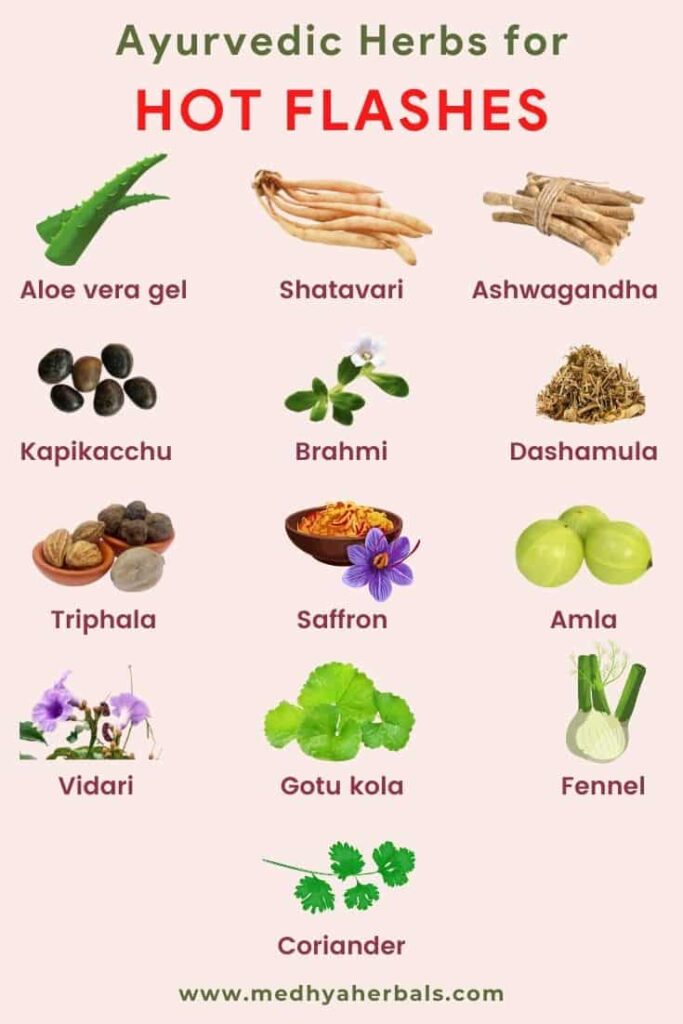
Ayurvedic Natural Remedies for Hot Flashes
Here is a list of Ayurvedic herbs and natural remedies for hot flashes that can provide fast relief and also help you to balance your hormones during menopause. Ayurvedic herbal supplements are plant based natural support system for your body. Here are some effective herbals:
- Shatavari (Asparagus racemosus): Known as the “Queen of Herbs” for female health, Shatavari is rich in phytoestrogens, plant-based compounds that can mimic the function of estrogen in the body. By helping to balance hormone levels, Shatavari can potentially alleviate hot flashes.
- Ashwagandha (Withania somnifera): Ashwagandha is an adaptogen, which means it helps the body adapt to stress. It can balance hormones, and its cooling effects may help manage hot flashes.
- Amla (Emblica officinalis): Also known as Indian gooseberry, Amla is a powerful antioxidant that can help reduce inflammation and oxidative stress in the body, potentially easing menopausal symptoms, including hot flashes.
- Licorice (Glycyrrhiza glabra): Licorice root can help balance hormone levels due to its phytoestrogen content. It’s often used in Ayurvedic medicine for managing symptoms of menopause.
- Black Cohosh (Cimicifuga racemosa): Although not traditionally Ayurvedic, black cohosh has been widely adopted due to its purported benefits in managing hot flashes and night sweats. It’s thought to work by affecting the hypothalamus and reducing luteinizing hormone, which often spikes during hot flashes.
Remember, while these herbs can be beneficial, they should be used under the guidance of a healthcare professional or a certified Ayurvedic practitioner. Different people may react differently to these herbs, and some may have contraindications with certain health conditions or medications. Therefore, it’s essential to consult a professional before starting any herbal supplement regimen.
Diet and Best Foods that help with Hot Flashes
Maintaining a healthy, balanced diet is crucial for managing hot flashes and overall well-being during menopause. Here are some dietary tips and foods that may help alleviate hot flashes:
1. Phytoestrogen-rich foods:
Phytoestrogens are plant-derived compounds that mimic estrogen in the body. Foods rich in phytoestrogens include:
- Soy products, like tofu, tempeh, and edamame.
- Flaxseeds, which are also a great source of omega-3 fatty acids.
- Whole grains, such as oats, barley, and brown rice.
2. Foods rich in Vitamin E:
This nutrient has been associated with reducing the severity of hot flashes. Foods rich in Vitamin E include:
- Nuts and seeds, particularly almonds and sunflower seeds.
- Spinach and other dark leafy green vegetables.
- Avocados.
3. Fruits and vegetables:
They are low in calories and can help manage weight, which is crucial as weight gain is linked with more severe hot flashes. Plus, certain fruits like melons and cucumbers have a high water content, helping to stay hydrated.
4. Foods rich in omega-3 fatty acids:
Omega-3s can help regulate mood swings that often accompany hot flashes. Foods high in omega-3s include:
- Fatty fish, such as salmon, mackerel, and tuna.
- Chia seeds and flaxseeds.
- Walnuts.
5. Lean proteins:
Including a good source of protein in every meal can help keep your blood sugar stable and prevent hot flash-triggering spikes and crashes.
6. Stay hydrated:
Dehydration can make hot flashes worse. Drink plenty of water throughout the day, and consider drinking cool herbal teas, such as chamomile or green tea, which might also help reduce hot flashes.
7. Avoid trigger foods:
Some foods and drinks are known to trigger hot flashes, including spicy foods, alcohol, caffeine, and foods high in added sugars. It may be helpful to keep a food diary to track what might trigger your hot flashes.
It’s important to remember that everyone’s body responds differently, and it might take some trial and error to find what works best for you. If you’re considering making significant changes to your diet, it’s a good idea to consult with a healthcare provider or a dietitian. They can help ensure you’re getting all the necessary nutrients while aiding in hot flash management.
Healthy Lifestyle for Managing Hot Flashes
Adopting a healthy lifestyle can significantly help manage and reduce the frequency and intensity of hot flashes. Here are some of the key aspects to focus on:
Regular Physical Activity
Regular exercise can help manage menopausal symptoms, including hot flashes, by improving overall health, reducing stress, and promoting better sleep in menopause. Whether it’s walking, cycling, swimming, or yoga, find a form of physical activity you enjoy and incorporate it into your daily routine.
Balanced Diet
Maintaining a balanced diet is essential. Include a variety of fruits, vegetables, lean proteins, whole grains, and healthy fats in your meals. Foods rich in phytoestrogens, like flaxseeds and soy products, can also help manage hot flashes.
Stress Management
Stress can exacerbate hot flashes, making stress management crucial. Practices such as yoga, mindfulness, meditation, or even simply taking a relaxing bath or reading a book, can help you unwind and reduce stress levels.
Hydration and Avoidance of Triggers
Staying well-hydrated is essential. Aim to drink 8-10 glasses of water a day, and consider sipping on herbal teas. Certain beverages, like coffee and alcohol, as well as spicy foods, can trigger hot flashes. Identifying and avoiding these triggers can help reduce the frequency of hot flashes.
Adequate Sleep
Quality sleep is crucial for overall health and well-being. Menopause insomnia can worsen menopausal symptoms, including hot flashes. Establish a regular sleep schedule and create a restful environment to improve your sleep quality.
Quit Smoking
Smoking can trigger hot flashes and worsen other menopausal symptoms. If you smoke, consider seeking help to quit.
Conclusion
Navigating menopause and its accompanying symptoms, such as hot flashes, can be a challenging and often overwhelming journey. We understand how difficult it can be to find relief, especially when symptoms interfere with your daily activities and overall quality of life. It’s important to remember that you are not alone in this journey, and there are a variety of resources available to assist you.
Ayurveda offers a holistic and natural approach to wellness, targeting the root cause of health concerns rather than just treating symptoms. By addressing the imbalances in your body that contribute to hot flashes, Ayurvedic treatment can provide lasting relief. Customized to your unique needs and health constitution, these Ayurvedic solutions emphasize a balanced diet, regular physical activity, stress management, and natural herbal supplements.
At Medhya Herbals, our team of experienced Ayurvedic doctors is committed to supporting you throughout your menopause journey. We invite you to schedule a consultation with us, where we can discuss your symptoms, concerns, and develop a personalized Ayurvedic treatment plan for your hot flashes. Allow us to partner with you in reclaiming your health and comfort. You’re more than a set of symptoms; you’re an individual with unique needs and aspirations, and we’re here to help you thrive through this stage of life.
FAQ
The Role of Stress and Lack of Sleep in Hot Flashes
Stress is a known trigger for hot flashes. The body’s response to stress involves the release of adrenaline, which can provoke a hot flash. Regularly practicing stress-reducing activities such as yoga, mindfulness, and deep breathing can help manage these symptoms.
Lack of sleep, often due to night sweats, can further exacerbate hot flashes. Maintaining a consistent sleep schedule, creating a cool and comfortable sleep environment, and avoiding stimulants like caffeine and alcohol close to bedtime can help improve sleep quality and, in turn, manage hot flashes.
Can Coffee Cause Hot Flashes?
Caffeine, often found in beverages like coffee and energy drinks, is a known stimulant. It can increase heart rate and blood flow, triggering hot flashes in some women. If you’re prone to hot flashes, it may be beneficial to limit caffeine intake or opt for decaffeinated versions of your favorite beverages. Alcohol, spicy foods, and hot drinks are other potential triggers worth noting.
How long do Hot Flashes last?
How long a hot flash lasts usually varies from individual to individual. Each particular episode of hot flash may last for few seconds or up to 10 minutes or more.
Vasomotor symptoms of hot flashes and night sweats can extend beyond Menopause. If left untreated, hot flash symptoms may last up until 10 years or more post-menopause.
The majority of the women suffer from hot flash symptoms for 1 – 2 years. However, approximately 15% may have persistent symptoms for up to 30 years. Hence, it is important to find relief through natural measures, remove the causes and triggers, and get appropriate treatment.
What can cause hot flashes other than menopause?
Hot flashes can be experienced in multiple other cases as listed below. Usually, the severity of the symptoms vary with individual and health condition.
- Hyperthyroidism patients may also suffer from frequent hot flashes.
- Hot flashes may happen in pregnancy as well, specifically in the first and second trimesters.
- Certain medications such as androgen deprivation therapy in males or Lupron for infertility treatment can also trigger hot flash symptoms
- Cancer
- Hot flashes in men
- During menstruation
How do I know if I’m having a hot flash?
Following steps list down a typical sequence of the symptoms faced by anyone who is experiencing a hot flash:
- The intense heat in the upper body including the upper arms, face, neck, and chest
- Flushing of the skin follows
- Profuse Sweating
- Followed by chills
- Hot flash symptoms are often accompanied by tingling in fingers, palpitations, and anxiety
When do Hot Flashes Start?
Perimenopause refers to the transitional phase that leads up to menopause, where the production of estrogen, the primary female sex hormone, starts to decline. During this phase, from about 48 to 53 years, many women begin to experience hot flashes. They may start subtly and infrequently, gradually increasing in intensity and frequency as one approaches menopause.
Postmenopause, the stage after menopause, can still see hot flashes persisting. Usually, one experiences high intensity symptoms 2 years after Menopause. Many women continue to experience hot flashes years into postmenopause, albeit typically with reduced intensity and frequency. In postmenopause, the ovaries have ceased releasing eggs and making most of their estrogen. While the reduced estrogen level is a main factor behind hot flashes, other factors like lifestyle and genetics can also play a role.
Can Hot Flashes Stop and Start Again?
Indeed, hot flashes can stop and then restart. Some women might go weeks or even months without experiencing a hot flash, only to have them recur. This can sometimes be related to external triggers such as stress, caffeine, alcohol, spicy foods, tight clothing, heat, and cigarette smoke. Understanding and avoiding these triggers can help manage hot flashes. Hormonal fluctuations can also cause a sudden return of hot flashes. This is why it’s crucial to maintain a dialogue with your healthcare provider to effectively manage and monitor these symptoms throughout the stages of menopause.
Does Ginger Stop Hot Flashes?
Ginger is a powerful root known for its diverse health benefits. Some preliminary research suggests that ginger might help in reducing the frequency and intensity of hot flashes, though more research is needed. Ginger helps improve circulation and can promote sweating, which can help the body cool down during a hot flash.
Is Coconut Water Good for Menopause?
Yes, coconut water is beneficial during menopause. It’s a great source of hydration and is packed with electrolytes, essential for maintaining body temperature. It also contains phytoestrogens, which can help balance hormone levels and potentially alleviate symptoms like hot flashes.
How does your brain control your body temperature?
The thermo regulatory zone in the hypothalamus section of the brain tightly controls our core body temperature. Temperature regulation happens through a series of actions that result in heat release or heat generation.
When the body’s core temperature increases above the upper threshold of the thermo-regulatory zone, sweating occurs, which allows your body to cool down.
Anything that hampers the functioning of brain and body in controlling the core temperature can result in a feeling of excessive heat or coldness.
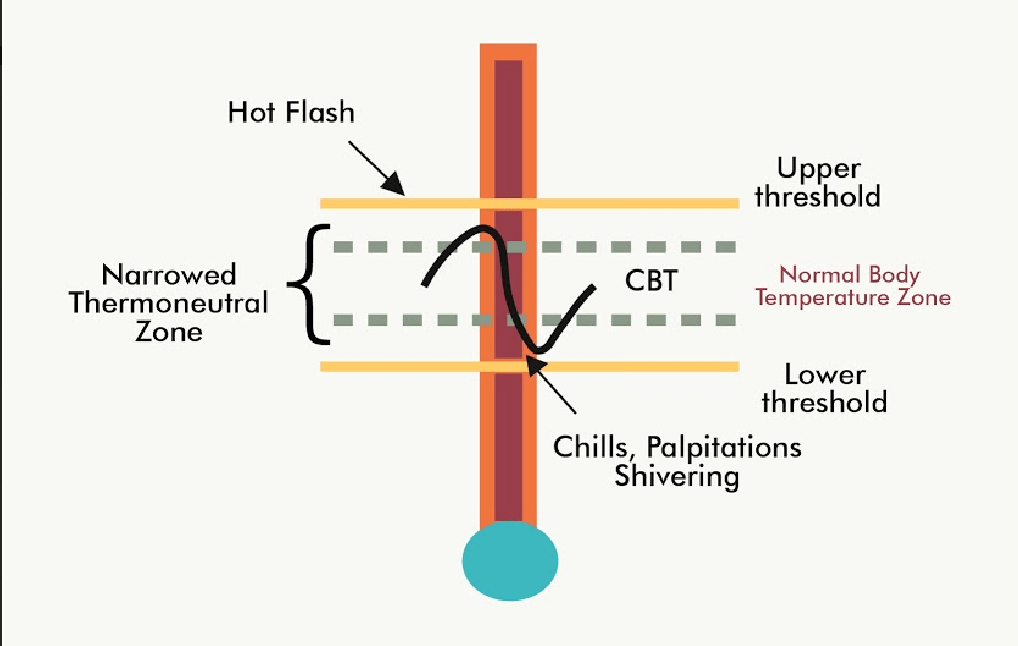
Hot Flashes Treatment in Modern Medicine
Modern medicine does not provide specific hot flash treatment, however there are several options provided to manage the symptoms or lower down the intensity of inconvenience caused by intense symptoms.
HRT or hormone replacement therapy via Estrogen or Progesterone or combined is one of them. Other alternatives such as behavioral modifications, hypnosis, natural diet, and herbs are also suggested to find relief from the symptoms.
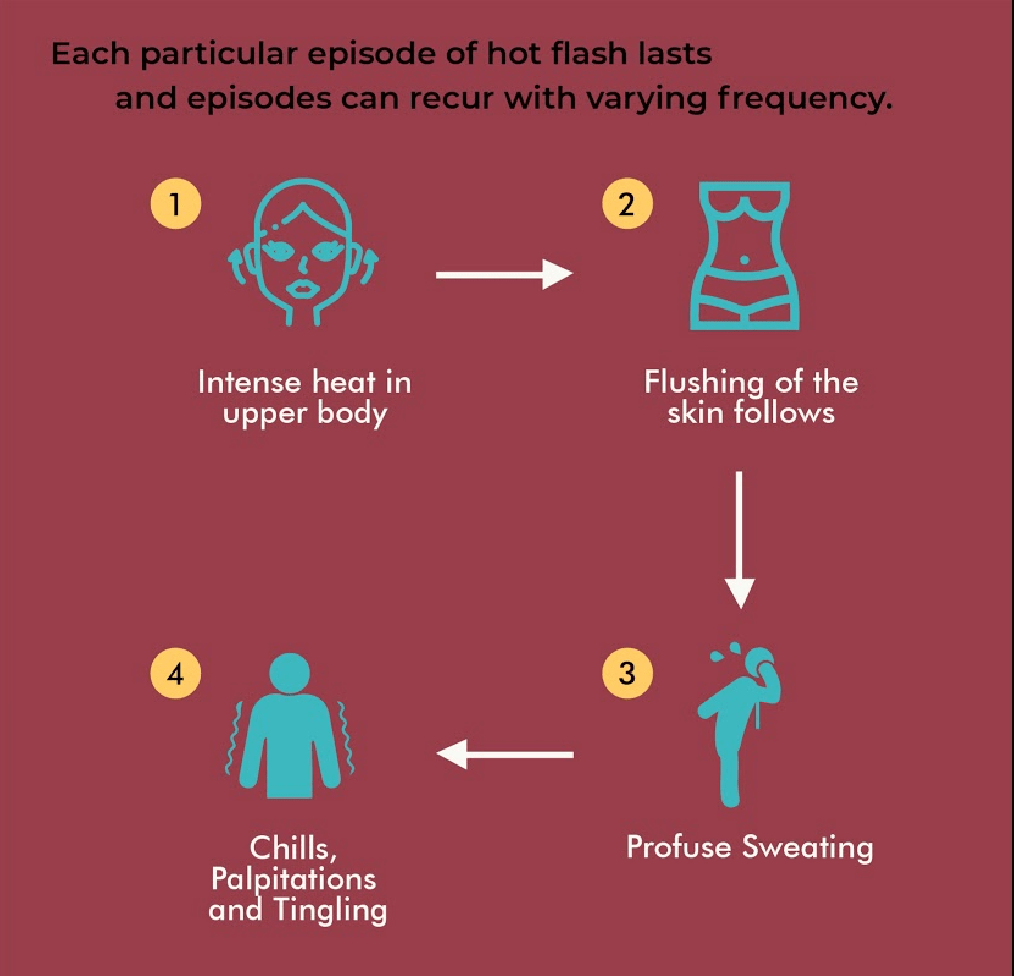
What happens to your body when you have a Hot Flash?
A typical hot flash wave can be explained in three steps as listed below:
Step 1: A Hot Flash may be triggered by simple daily stuff such as spicy food, hot weather, or stress. Hot Flash triggers often tend to increase our body temperature. As the brain is not able to regulate the body temperature in time, patients often observe intense feeling of heat.
Step 2: The delayed action of brain shoots the body temperature. It brings the body temperature back to normal by increasing blood circulation and by sweating. If this action doesn’t go well, patients may experience palpitations and severe anxiety.
Step 3: Chills and Excessive Sweating. It usually happens in severe cases of circulatory malfunction such that your brain and body are highly disconnected. When the brain sends too many signals to cool off the body, it may go down much below the targeted temperature. This can lead to excessive sweating and chills.

